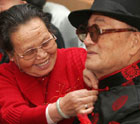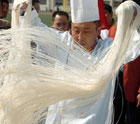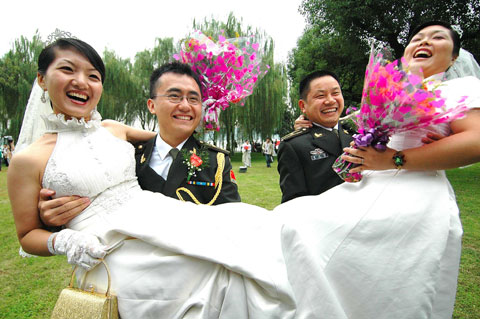http://www.ft.com/cms/s/8a170396-c504-11db-b110-000b5df10621.html
For years, China has been subjected to sharp foreign criticism about conditions in its factories amid claims that its cheap exports come at the expense of the environment and workers' safety and pay.
In recent months the debate has taken a twist, with an increasing number of similar charges levelled from inside China, by officials and quasi-government industry bodies concerned about an export backlash.
For the first time, an industry body, the China National Textile & Apparel Council, formerly a ministry, has launched a programme pushing "corporate social responsibility".
CSR, a tool used by many multinationals to burnish their credentials as good corporate citizens, is a set of voluntary principles adopted by businesses to take account of the economic, social and environmental effects of its work.
The council says its pilot scheme for nine member companies to adopt CSR principles is essential to the textile industry's survival.
"This is not just China trying to take care of its image, but also to improve management and look after our workers. We have no choice but to do this," said Sun Ruizhe, a vice-president of the council in Beijing.
The textile industry's scheme coincides with a push from ministries in support of CSR, turning a concept hitherto unknown in China into a buzz-word. The National Development and Reform Commission, the powerful economic planning ministry, and other agencies have recently backed seminars in Beijing about CSR.
Cheng Siwei, who wields influence through his position in the National People's Congress, added weight by threatening to penalise companies that "blindly" pursued profit and neglected their social responsibilities.
Mr Cheng's comments followed the latest wave of malfeasance by state-owned and private groups, including coalmine disasters, polluting factories and the use of dangerous food additives.
"Neither China nor the rest of the world will accept the notion that capital knows no morality, that one can be rich and yet irresponsible at the same time, that wealth and benevolence are breeds apart," Mr Cheng said in a newspaper article.
As one of the country's largest industries and exporters directly employing 20m people, the textile sector is an obvious candidate for CSR in China. The council oversees 38,000 companies in the industry with annual turnover of more than Rmb5m ($640m, ?90m, £330m) each and whose revenues collectively reached Rmb2,500bn in 2006, up 26 per cent year-on-year.
The end of a global quota system for textiles in 2004 has created a boom for Chinese exports, provoking a backlash in European countries and in the US. China exported $144bn worth of apparel and textiles in 2006, up 23 per cent year-on-year.
Mr Sun rejected claims that the CSR push was a cynical attempt to fend off pressure for better labour and environmental standards, saying Chinese companies needed higher standards to stay competitive. "By taking care of our workers’ interests, the companies have increased productivity," he said.
A spokesman for one of the companies in the scheme, Hempel China, in the textile centre of Hangzhou, said it had increased costs but was a "necessary investment", but did not have as much effect as when teams dispatched by large foreign buyers inspected safety and labour standards in factories.
"[The Chinese scheme] mainly relies on self-supervision. There are no external checks. Foreign buyers won’t recognise such a practice," he said. "Although [the enforcement of the foreign standards] costs a lot of money, we have to adopt it as they are stricter in assessments and licensing."
Philippa Kelly, who works at an EU technical assistance programme in Beijing, said CSR programmes in China differed from those in the west, where they imposed obligations on top of the law.
"In China, it is an attempt by the government to get companies to abide by the law," she said. "It may ease some trade friction, but it does not necessarily help exporters trying to be more responsible, as it makes their products more expensive. They may lose out to cheaper, less scrupulous, suppliers."
The workers who are supposed to benefit do not always appreciate such assistance. A Hong Kong activist group recently campaigned against conditions in a factory contracted to make souvenirs for Walt Disney. Disney, or its sub-contractor, withdrew the orders, prompting workers who lost their jobs to stage a noisy protest outside the factory.











